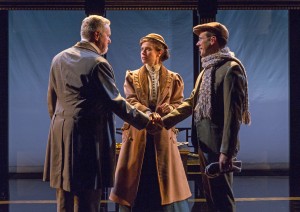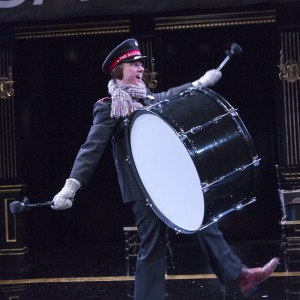George Bernard Shaw's Major Barbara challenges Percy Bysshe Shelley’s assertion that poets are the "unacknowledged legislators of the world." So long as governments co-exist uneasily and individuals are unable to live in harmony with those sharing the planet, suggests Shaw in his 1905 play, munitions-makers will rule the global roost.
Major Barbara, currently revived at The Pearl Theatre Company, didn't arrive on Broadway until 1915, by which time World War I was well underway in Europe. The play begins as high comedy, shifts disconcertingly to naturalism in Act Two, and concludes with a fantastical debate in which the title character (Hannah Cabell), a Salvation Army officer, and her fiancé, Adolphus Cusins (Richard Gallagher), undergo changes of heart that strain credibility to a greater extent than usual in Shaw's work. Despite its structural flaws, Major Barbara is a perpetual crowd-pleaser; this comedy-drama and its heroine may be second only to Pygmalion and its principals, Liza and Professor Higgins, as Shaw's audience favorites.
When the last prominent New York revival of Major Barbara opened (with Cherry Jones in the lead), the towers of the original World Trade Center still drew the eye to lower Manhattan; and Americans were enjoying the benefits of an extended era of peaceful (or relatively peaceful) relations abroad. Six days before the play’s scheduled closing, the Trade Center was attacked by air and both towers were destroyed. That tragedy moved the U.S. President to declare a Global War on Terror and to sign, two days after the play's closing, the Authorization for Use of Military Force. The years since have been marked by American combat in Afghanistan, Iraq, and elsewhere, as well as fluctuating economic conditions, with an ever-widening gap between rich and poor. Shaw's concerns about poverty, privilege, war, and religion seem more urgent now than they did in the summer of 2001.
As always at the Pearl, an array of accomplished actors is on view. Dan Daily gives the evening’s most notable performance as Barbara's father, the fiendishly clever Andrew Undershaft, an armaments kingpin who believes poverty to be the world's most heinous crime. Undershaft riffs on the Republic: “Plato says … that society cannot be saved until either the Professors of Greek take to making gunpowder, or else the makers of gunpowder become Professors of Greek.” Daily is well-matched by Gallagher as the geeky Greek tutor who, against all odds, becomes Undershaft's heir both in the family and on the world's political stage.
Major Barbara is directed by David Staller, founding artistic director of the Gingold Theatrical Group which is co-producing with the Pearl. The stylish production is designed by James Noone (scenery), Tracy Christensen (costumes), Michael Gottlieb (lighting), and M. Florian Staab (sound). Six of the nine actors handle two roles (or, in one case, three), moving effectively up and down the social ladder. In a program note, Staller explains this doubling as inspired by a remark of Shaw’s that, “but for an accident of birth,” characters such as the aristocratic Lady Britomart and the middle-middle-class Mrs. Baines, the Salvation Army Commissioner (both played by Carol Schultz), or the prim, high-born Stephen Undershaft and the unemployed lout Snobby Price (played by Alec Shaw), “might have become one or the other.” Christensen’s resourceful costume designs aid the actors in shifting swiftly from one social stratum to another in plain view of the audience. It’s a dash of Brecht in an evening of Shaw.
The great Irish dramatist named his play for Barbara but, as he revised it, her father emerged as the most forceful of the dramatis personae. In the wrong hands, Undershaft can overwhelm the other characters (especially in the last scenes). Daily tempers his performance, a model of actorly restraint, so as to recalibrate the lopsided exuberance of Shaw's text and ensure balance among Undershaft, Adolphus, and Barbara in their memorable but tricky last-act trio.
Shaw called the conclusion of Major Barbara “terrible” and lamented that, despite a quarter century of post-premiere tinkering, he couldn't eliminate the flaws. In the 2001 revival, the principal actors made the final scene convincing with the emotional force of their performances. Under Staller's supervision, the Pearl's cast does justice to the wit of Major Barbara but seldom conveys the raw feeling that ought to animate the brainy talk. Without that, there's no accepting the conviction of Barbara and Adolphus that they can save the world by forsaking charity and classical learning for the armaments industry.
Major Barbara is playing through December 14 at the Pearl Theatre Co. (555 West 42nd St.). Performances are Tuesday at 7 p.m.; Wednesday, Saturday, and Sunday at 2 p.m.; and Thursday–Saturday at 8 p.m. Tickets are $65 for regular admission; $39 for seniors; and $20 for students and rush Thursday. For tickets, please visit pearltheatre.org or by call 212-563-9261.



